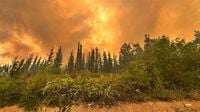Widespread and unprecedented fires have erupted in the mountains surrounding Jerusalem, prompting Israeli authorities to declare a state of emergency and evacuate several towns. As the blazes rapidly expanded, Prime Minister Benjamin Netanyahu announced that he would seek international assistance if necessary.
According to reports from Israeli media, the fires broke out on Wednesday, April 23, 2025, and quickly escalated, leading to the evacuation of towns approximately 20 kilometers west of Jerusalem. Fire crews have been working tirelessly to contain the flames, which have posed a significant threat to populated areas.
On Thursday, April 24, 2025, Netanyahu directed officials to maintain contact with the European Union and other nations to solicit aid. "We will obtain assistance from neighboring countries if necessary," he stated during a visit to the operations room responsible for firefighting efforts.
The Israeli Fire and Rescue Authority has mobilized over 110 firefighting teams and 11 aircraft, all dedicated to combating the fires in the Ishtaol area of the Jerusalem mountains. However, the situation remains dire, with reports indicating that three firefighters sustained injuries while battling the flames.
In response to the escalating crisis, Israeli police have implemented immediate evacuation operations for residents in threatened areas. They also announced the closure of Road No. 1, a major route linking Jerusalem and Tel Aviv, due to the proximity of the fires, complicating traffic and emergency response efforts.
The Israeli police have stated their priority is to maintain a general alert for firefighters to address the fires and prevent their spread. As the situation develops, the government has issued a general alert to all firefighting personnel across the country.
As the fires rage on, the Israeli government faces mounting pressure to control the situation. The rapid spread of the flames has raised concerns among residents and officials alike, highlighting the challenges posed by extreme weather conditions. The ongoing heatwave has exacerbated the situation, making it difficult for firefighting teams to contain the blazes effectively.
Netanyahu's administration is now at a crossroads, balancing the urgent need for local firefighting efforts with the potential requirement for international aid. The Prime Minister's proactive approach in reaching out to neighboring countries for assistance reflects the seriousness of the crisis.
Authorities have also reported that traffic disruptions are expected as the fire spreads, with several trains halted in affected areas. The urgency of the situation has prompted the Israeli government to consider all options to ensure the safety of its citizens and effectively combat the fires.
As firefighting efforts continue, the Israeli public remains on high alert, with many residents evacuated from their homes and seeking shelter elsewhere. The government has assured the public that it is doing everything possible to manage the crisis and protect lives.
This incident serves as a stark reminder of the increasing frequency and intensity of wildfires globally, often linked to climate change and extreme weather patterns. As the world grapples with these challenges, the events unfolding in Israel underscore the urgent need for coordinated efforts to address such disasters.
As of now, the situation remains fluid, with firefighting teams working around the clock to bring the blazes under control. The Israeli government continues to monitor the situation closely, ready to adapt its response as necessary.
In conclusion, the fires in the Jerusalem mountains are a significant event, highlighting both the immediate dangers posed by natural disasters and the broader implications of climate change on global safety and security.




